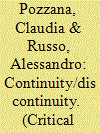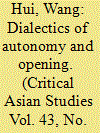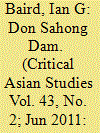|
|
|
Sort Order |
|
|
|
Items / Page
|
|
|
|
|
|
|
| Srl | Item |
| 1 |
ID:
105063


|
|
|
|
|
| Publication |
2011.
|
| Summary/Abstract |
Starting from issues Wang Hui raises in "The Dialectics of Autonomy and Opening" (Critical Asian Studies 43:2), the authors of this article focus on the problematic coexistence of continuities and discontinuities in modern and contemporary Chinese politics. China's present role in the international scene, they argue, cannot be assessed in terms of economic performance, but requires new perspectives for rethinking the search of China for an original path in domestic politics, as well as the universalistic attitude toward the various forms of thinking coming from all over the world.
|
|
|
|
|
|
|
|
|
|
|
|
|
|
|
|
| 2 |
ID:
105062


|
|
|
|
|
| Publication |
2011.
|
| Summary/Abstract |
This essay presents a consideration of the past sixty years of Chinese economic development. It argues that in order to understand the success of Chinese development the analyst must consider the prior Maoist years and in particular the structures of social relations; the forms of sovereignty; and most important, the highly participatory mobilizations of peasants and workers in building China. The author argues that the legacy of these earlier policies is key to a proper grasp of the current moment. In this sense, the "dialectics" refer to the ongoing relationship among past, present, and the possible future.
|
|
|
|
|
|
|
|
|
|
|
|
|
|
|
|
| 3 |
ID:
105061


|
|
|
|
|
| Publication |
2011.
|
| Summary/Abstract |
Plans are underway to construct twelve large hydropower projects on the un-dammed lower and middle mainstream Mekong River in Laos, Thailand, and Cambodia. One of the planned projects is a 30-32 meter-high hydroelectric dam with an expected 240 MW installed generating capacity to be built on the Hou Sahong Channel, less than one kilometer north of the Laos-Cambodia border, in the Khone Falls area of Khong District, Champasak Province, southern Laos. The project's objective is to generate revenue by exporting electricity to Thailand or Cambodia. Concerns have been raised about the Don SahongDam(DSD), however. The main ones relate to potential repercussions on aquatic resources, and especially wild-capture fisheries dependent on migratory fish. This article examines the regional implications of the DSD, including possible impacts on food security, nutrition, and poverty alleviation. Fisheries losses in the Mekong Region from the DSD would negatively affect the nutrition of hundreds of thousands or even millions of people, especially in parts of Laos, Cambodia, and Thailand where nutritional standards are already low. Mekong fisheries are integral to food security in the region, and the DSD would make it difficult for governments, especially in Laos and Cambodia, to reach their health-related United Nations Millennium Development Goals and their objectives for reducing poverty.
|
|
|
|
|
|
|
|
|
|
|
|
|
|
|
|
| 4 |
ID:
105060


|
|
|
|
|
| Publication |
2011.
|
| Summary/Abstract |
The channeling of popular struggles through legal cases is central to the strategy of the emerging "rights defense" movement in China, linking grassroots contention with professional mediators who translate grievances into the institutional environment of law. This was the case in an unusual, ultimately unsuccessful campaign in 2005 to remove an elected village chief in Taishi Village in Guangdong, China, by legal means. While the grievances that sparked the campaign were about the unequal distribution of the benefits from village development, the strategy of instituting a recall procedure and the framing of the campaign in terms of democracy and rule of law obscured distinctly gendered issues of poverty and inequality in the village, even though women were among the most visible protesters. This article employs a "sociology of translation" to link framing processes and power dynamics, thus proposing a methodological approach to reconnecting framing with other aspects of movements. In the Taishi case, the translation of the dispute into the language of law had contrary effects: it opened the door to a legitimate, if temporary, public space for the airing of villagers' claims. At the same time, translation legitimized the voices of "experts" who then became de facto leaders in this public space; it also increasingly shifted the action to the internet, to which the villagers apparently had no access. This analysis raises questions about whether such strategies may result in either the formation of durable rights-based identities among grassroots participants or a sense of being connected to a broader social movement.
|
|
|
|
|
|
|
|
|
|
|
|
|
|
|
|
| 5 |
ID:
105065


|
|
|
|
|
| Publication |
2011.
|
| Summary/Abstract |
In this comment on an article published in Critical Asian Studies 43 (1), "Migration in Far West Nepal," the author questions whether the "Bourdieu social practice framework," which Ephraim Poertner, Mathais Junginger, and Ulrike Müller-Böker employ in their article, provides the most appropriate lens through which to view migration. He argues that the authors fail to present convincing evidence of the relevance of its application. Furthermore, he says, a further dichotomy might need to be addressed first: that between French approaches to social theory and Anglo-Saxon approaches such as that of Anthony Giddens, where the timespace dimensions are much more evident, even if problematic, in the examining structure and agency.
|
|
|
|
|
|
|
|
|
|
|
|
|
|
|
|
| 6 |
ID:
105059


|
|
|
|
|
| Publication |
2011.
|
| Summary/Abstract |
Of the rich academic literature that has emerged on the growth and dynamism of the "informal economy" in South Asia in recent years very little work has focused on the Pakistani context. This article builds upon the growing body of work on "informal employment" by identifying and explaining modes of labor control in the housing construction industry in metropolitan Pakistan. The crucial role of the subcontractor and his exploitative relationship with workers is discussed in a Gramscian framework. Workers are ensconced in a hegemonic relationship with contractors due to oppressive structural conditions as well as a culture of dependency that contractors have nurtured. Against the backdrop of the shift from Fordist to flexible accumulation regimes, the author argues that the present conjuncture is marked by the prevalence of extra-economic forms of control such that workers conceive of contractors as patrons. The instrumentalization of cultural norms of reciprocity by contractors does not mean that the labor-capital relationship is unchanging and rooted in "culture." In fact, personalized patronage networks coexist with impersonal market ethics dynamically so as to produce and sustain the hegemony of capital.
|
|
|
|
|
|
|
|
|
|
|
|
|
|
|
|
| 7 |
ID:
105064


|
|
|
|
|
| Publication |
2011.
|
| Summary/Abstract |
Mainstream commentary suggests that the United States and NATO are conducting a war on drugs in Afghanistan in order to reduce drug consumption in the West and Afghanistan and weaken the Taliban. Interpreting U.S. foreign policy from a critical political economic perspective, this article presents an alternative analysis, arguing thatWashington and NATO are not pursuing a real war on drugs in Afghanistan. This point is demonstrated by examining a number of aspects of the so-called war on drugs: the Taliban's relatively small role in drug trafficking; U.S./NATO support for proxy forces involved in the drug trade; the focus on poppy cultivation over drug money; the chemical precursor trade; money laundering; Western support for tobacco and alcohol industries; and the emphasis on overseas operations and enforcement and neglect of drug treatment and prevention. In each case, U.S./NATO policies directly support or tolerate the drug trade-the opposite of what a real war on drugs would entail. It is therefore suggested that the so-called war on drugs is better seen as a rhetorical device used by the U.S. to facilitate overseas military intervention and the fight against insurgents opposed to U.S. policies in Afghanistan.
|
|
|
|
|
|
|
|
|
|
|
|
|
|
|
|
|
|
|
|
|